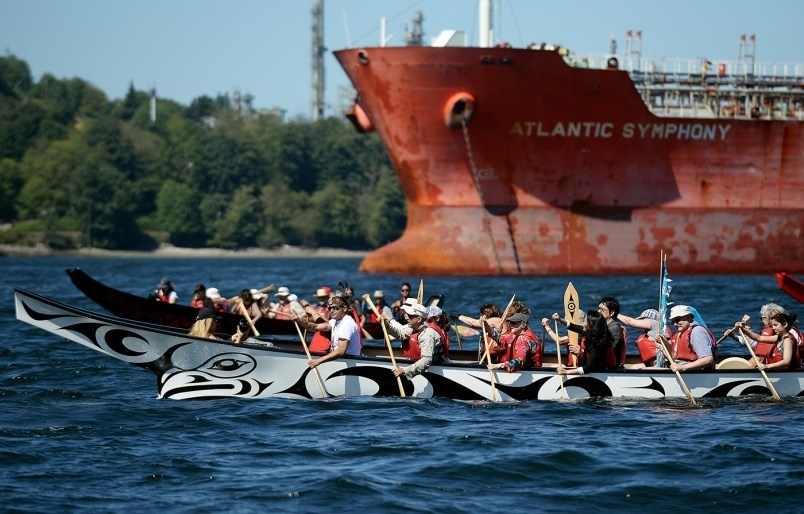First Nations on the North Shore are continuing to voice concerns about the latest round of consultations by a National Energy Board panel on the Trans Mountain pipeline expansion project.
Last week, the panel heard from several First Nations, including the Squamish and Tsleil-Waututh, at oral history hearings in Nanaimo.
But that process has done little to allay concerns that First Nations are really being listened to, said Squamish Nation spokesman Dustin Rivers, who goes by the traditional name Khelsilem.
“The federal government has failed to respect indigenous rights,” Khelsilem said at a press conference Thursday in Ottawa.
The government is making the same mistakes it made last time in consulting indigenous people, said Khelsilem, “and will lead to the same result.”
The latest round of hearings stemmed from a court decision this summer when the Federal Court of Appeal overturned the federal government’s approval of the Trans Mountain pipeline expansion, on the grounds the board had not consulted adequately with First Nations and had not considered its possible impact on the marine environment.
As part of the response, the panel recently held sessions in Alberta, Victoria and Nanaimo.
The Tsleil-Waututh also presented evidence at the hearing last week.
In a press statement, Chief Maureen Thomas said the nation “remains concerned about the harmful impacts” of the proposed pipeline, particularly in terms of tanker traffic.
Both the Squamish and Tsleil-Waututh said they objected to the compressed 22-week schedule the federal government gave the National Energy Board to come up with a new report.
Khelsilem said the process contains “arbitrary deadlines and timelines,” including a requirement that the federal government make a decision within 90 days of a new report from the National Energy Board. “They’re saying there is no timeline but there is a timeline,” he said.
North Shore NOPE, a local environmental group, also made a presentation at the hearings last week, focusing on the risks to the environment, human health and to North Shore communities from marine shipping of diluted bitumen.
The pipeline project poses “unacceptable risks of severe adverse effects to the health and wellbeing of North Shore communities and the marine environment of Burrard Inlet,” the group wrote in its opening statement.
Judy Wilson, secretary for the Union of B.C. Indian Chiefs, who was with Khelsilem at the Ottawa press conference Thursday, said she’s still concerned that the federal government is now both the owner and regulator of the pipeline. “It was a bad decision to purchase this pipeline. I don’t think it was adequately considered at all,” she said.
When Indigenous leaders spoke to Prime Minister Justin Trudeau, he told her, “(the federal government) purchased it and they’re putting it through,” she said. “We’re here to say, ‘No you’re not.’”



